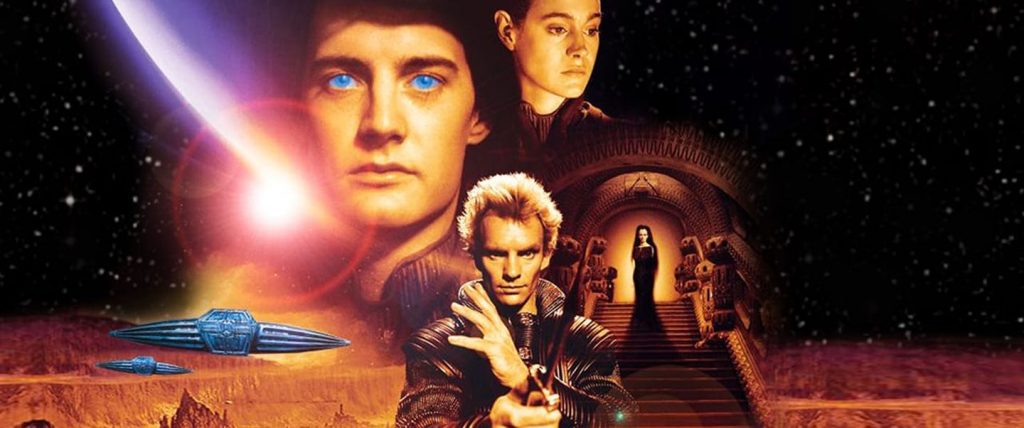Faven Tesfamichael (10) | STAFF REPORTER
Often argued to be one of the best science fiction books written, Dune by Frank Herbert finds relevance to this day with its interesting plot and subplots that delve into real-world problems. In this book, Frank Herbert creates a new universe that functions in familiar yet alien ways. Dune, published in August of 1965, is a sci-fi book that is most certainly unique from the language to the monarchy involved. However, while it does create this alien universe Dune also shows how humanity always finds its own ways to balance order and chaos.
The book follows the story of a 15-year-old boy named Paul Atreides, the successor to his father Duke Leto Atreides and the son of Lady Jessica. The story takes place around 10,000 years in the future where the universe is ruled and fought over by multiple royal houses. One planet, in particular, is coveted by all houses; the planet Arrakis. Arrakis is the only planet in the universe where ‘the spice’ can be found. The spice, also known as melange has special properties that give whoever ingests it power. Ownership of Arrakis is on a rotational basis and each house tries its hardest to maintain longer ownership while also making conditions harder for the next house. Dune takes place during the house change where his house, House Atreides, is taking the place of their enemies, House Harkonnen. In such a competitive atmosphere betrayal is stirred and forces the young Paul Atreides to mature and take on the mantle of Duke.
Dune was like the anti-Star Wars, undoing everything Lucas’s trilogy did to make sci-fi a friendly place.
Daniel D. Snyder
An interesting topic in Dune is the influence that politics claims on the overall plot. The idea of having different houses that rotate custody of a planet, which also holds some of the universe’s most powerful substance, is bound to result in many conflicts. The conflicts seen in the story are similar to real-life political issues in many ways. A comparison that can be made to real-life from reading the book is the fact that all political systems are left vulnerable to manipulation. The dynamics held by House Harkkonen especially show how some political tactics are mainly motivated by one’s self-interest and not the well-being of the people. Throughout the entirety of the book, Lady Jessica constantly reminds Paul she never married the Duke because it would be seen as disgraceful for Duke Leto to marry a concubine. Later on in the book, after Paul has become the new Duke and he meets Chani, Lady Jessica makes it a point to tell him that if he were to marry Chani it would be shameful for their family. Overall, while there are many foreign topics in this book, the role that politics play in the plot is just as important as the role that politics play in real-life.
Dune is an interesting book and the characters themselves are no less stimulating. To start, the main character of Dune is 15-year-old Paul Atreides who is to take control of House Atreides when his father, Duke Leto Atreides dies. Paul is a character who has been forced to grow up much faster than others his age. Paul must undergo much physical and mental training for him to be ready to take over for his father at any moment. Paul’s father, Duke Leto Atreides, is continuously busy and suspicious of betrayals from House Harkonen. Paul’s mother Lady Jessica has a quite interesting backstory as she is a member of the Bene Gesserit meaning that she has quite the mental power. Every character mentioned in Dune has significance and plays an essential role in the full story. In each location that the plot follows, new side characters are introduced each with their own personality. Altogether, Dune has many dynamic characters, most notably: Vladimir Harkonen (the main antagonist), Gurney Halleck, Duncan Idaho, Chani and Doctor Yueh.
When reading Dune there are many new vocabulary and terms introduced. As Frank Herbert created Dune, he made sure to sculpt this universe in a way that is meant to feel alien and he certainly does achieve his goal through the use of foreign terms. To make the story feel as authentic as possible, Herbert created glossary pages in the book so that the story could be read with a proper understanding. In addition to glossary pages, there are three Appendices included in the book to expand on topics covered in the story. The Appendices included in the book are The Ecology of Dune, The Religion of Dune and Report on Bene Gesserit Motives and Purposes. There are also many sequels and prequels to Dune that provide more insight into the life of Paul Atreides and his family.

Dune was a groundbreaking book that provided new perspectives and attributes to the world of sci-fi. From the sandworms living in the terrain of Arrakis to the Bene Gesserit Litany Against Fear, Dune has had a lasting influence on pop culture. Some references to Dune can be seen in Star Trek, Chronicles Of Riddick, The Kingkiller Chronicle and Futurama. However, Dune’s largest influence can be seen in George Lucas’ Star Wars. Some of the influence that Dune has had on Star Wars can be seen in the parallels between Tattoine and Arrakis, moisture/dew collectors, sand crawlers, sandworms and most importantly the connection between the Empire and the Imperium.
After Dune was well received by the science fiction community, many people began to expect a movie. Consequently, in 1984 David Lynch released the first movie adaptation of Frank Herbert’s Dune. However, this movie was not as well-received and was littered with topics for critics to discuss. As previously mentioned before, Dune has a special vocabulary that could only be properly understood if explained to the audience. The popular phrase, “show don’t tell” comes to mind when reviewing Dune (1984) due to the fact that the film largely relies on the work of a narrator. The fact that the movie did not provide much explanation and did not ‘show’ as much as it ‘told’ led to its poor reactions. Many people also found that the movie did not focus enough on some aspects of the story. Director Denis Villeneuve who also enjoyed the book decided to take another chance at making Dune into a movie. After taking time to craft a movie that Villeneuve felt did justice to Frank Herbert’s Dune universe, the new Dune movie was scheduled to be released in 2020 with Timothée Chalamet as the lead. However, due to complications with the COVID-19 pandemic, the movie is now projected to be released sometime in late 2021.
Dune was an exciting and incredibly creative read that surely left its mark on the world. August 1, 1965, will always be remembered when a new and beautiful universe was introduced to the world.



